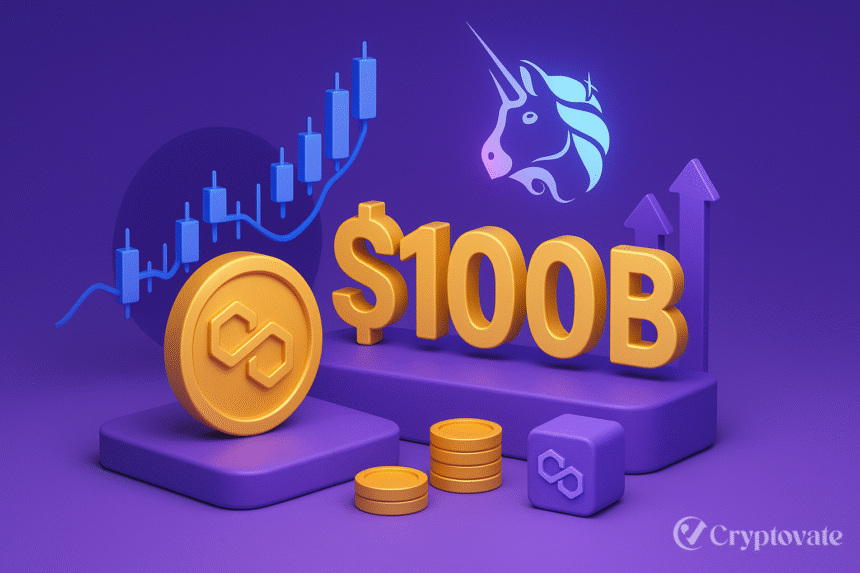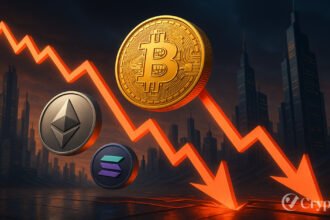– Ad –
| Getting your Trinity Audio player ready... |
The decentralized finance (DeFi) world is buzzing with excitement as Polygon, a leading layer-2 scaling solution for Ethereum, has surpassed $100 billion in all-time trading volume on Uniswap. This remarkable milestone, achieved in 2025, underscores Polygon’s growing influence in the blockchain ecosystem and marks a pivotal moment for the future of DeFi. With its ability to offer faster and more affordable transactions, Polygon is redefining how users interact with decentralized applications, making it a true game-changer in the industry.
Polygon’s success is rooted in its scalability, processing thousands of transactions per second at a fraction of Ethereum’s cost. This efficiency has attracted a wave of developers and users, driving the adoption of DeFi tools beyond simple trading. A notable initiative, Karpous, allows individuals to invest in real-world assets without the need for a crypto wallet, simplifying access for newcomers. The $100 billion mark reflects growing trust in Polygon’s security and performance, key factors in a competitive landscape. Experts suggest this milestone could spark further investment in layer-2 technologies, potentially reshaping the blockchain industry in the coming years.
A key advantage of Polygon is its extremely low transaction costs, typically averaging under one cent per transaction. This affordability, combined with confirmation times of under two seconds, has made it a preferred choice for users seeking cost-effective DeFi solutions. The network’s growth aligns with a broader trend of layer-2 solutions gaining traction as Ethereum continues to evolve with its upgrades. Developers are now building innovative DeFi platforms on Polygon, including lending services and NFT marketplaces, further expanding its ecosystem. This milestone also coincides with increased institutional interest, with firms exploring Polygon for stablecoin transactions, signaling a shift toward sustainable DeFi growth.
Also Read: Top 10 dApps to Watch in 2025: Discover Trending Projects with DappRadar
The Impact on DeFi and What Lies Ahead
Polygon’s integration with Uniswap, a leading decentralized exchange, highlights its versatility in supporting large-scale trading ecosystems. The $100 billion volume is a testament to the network’s ability to handle high demand while maintaining efficiency, setting it apart from high-gas networks like Ethereum. This achievement could encourage other blockchains to adopt similar scaling solutions, fostering a more competitive and innovative DeFi space. As global transaction volumes hit record highs in 2025, Polygon’s success positions it as a cornerstone of the next wave of decentralized finance.
Looking forward, this achievement paves the way for additional expansion. Analysts predict that Polygon will see more DeFi innovations, potentially leading to new partnerships and expanded use cases. The network’s ability to reduce reliance on expensive blockchain infrastructure could attract even more users and developers, solidifying its role as a DeFi powerhouse. With its low costs and rapid transaction speeds, Polygon is poised to shape the future of decentralized finance, making this $100 billion milestone a stepping stone to greater achievements.
FAQs
What makes Polygon different from Ethereum?
Polygon stands out as a layer-2 solution that enhances Ethereum’s capabilities by offering faster transactions and lower costs, capable of handling thousands of transactions per second.
How does Uniswap benefit from Polygon?
Uniswap leverages Polygon’s scalability to provide quicker, cheaper trades, drawing in a larger user base to its decentralized exchange platform.
Can anyone invest using Polygon’s new initiatives?
Yes, platforms like Karpous on Polygon enable wallet-free investments in real-world assets, making it accessible to a wider audience.
What’s next for Polygon after this milestone?
The future looks bright with expectations of more DeFi innovations and potential collaborations as Polygon continues to expand its ecosystem.

















